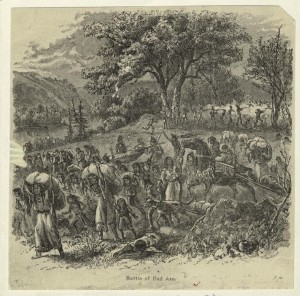
“HOW SMOOTH MUST BE THE LANGUAGE OF THE WHITES, WHEN THEY CAN MAKE RIGHT LOOK LIKE WRONG, AND WRONG LIKE RIGHT.”-BLACK HAWK[1]
Casualties of War:
77 White Soldiers/Army Militia, Dead
450 to 600 Native Americans, Dead[2]
The Black Hawk War is a war that is lost in history, which many of us forgot or never learned. Many of us didn’t learn about it because we never wanted to know the harsh reality behind our history. In our history classes we’ve learned about the different Native American wars, but we failed to focus on wars in our own land. Those of us who have learned about the Black Hawk War struggle to understand the cause of the war. Before I address the cause, I’d like everyone to have a basic understanding of the war.
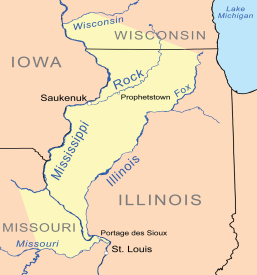
In 1804 there was a treaty between the future president William Henry Harrison and two representatives of the Suak nation. The government believed that they paid $2500 to open all Sauk lands east of the Mississippi for settlement. However, Sauk chiefs in both Illinois and Wisconsin thought that the treaty was invalid because the two negotiators didn’t have the authority to speak for the whole nation. So the Sauks continued to live on their land regardless of the treaty. A quarter century later, thousands of settlers moved into the Sauks land, forcing the Sauks to move across the Mississippi river. The Sauk nation was promised enough corn to survive the winter if they moved across the river. This promise was never upheld, making the Sauk people very angry. Lead by Black Hawk, about 1200 Sauks returned to the Illinois side of the river, in hopes to re-inhabit their land and to harvest their corn. On May 14th, 1832, Black Hawk and his followers were met by the Illinois militia, which turned into the first battle of the Black Hawk War. Through the course of the war, Black Hawk and his warriors were creating tactical diversions in order to allow the noncombatants to cross the Mississippi safely. The Sauks had several attempts at surrendering that were misinterpreted by the American Troops. On August 1st, 1832, the surviving Sauk made an attempt to cross the Mississippi. After seeing a gunboat on the river they attempted to surrender, this surrender was either misinterpreted or disregarded. The gunboat and the militia on foot behind the Sauks open fired killing many, including women and children.[3] This battle (Battle of Bad Axe) leads to the end of the War because many of the original 1200 Sauks died.[4] To assure the safety of his people Black Hawk turned himself in on August 1st, 1832, to officially end the Black Hawk War.[5]
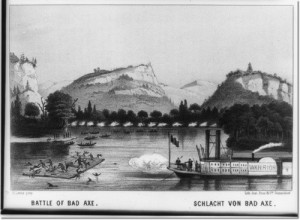
From reading my short summary or doing your own research, you may speculate the different causes of the Black Hawk War, but may never come to a definitive answer on what actually caused it Some believe it was caused by the treaty of 1804, others believe it was a misunderstanding between the Sauk and the settlers, and some believe the Sauks were fighting for their land. These speculations are correct; nevertheless, the causes of the war were the United States seizure of the Sauk’s land and racial tensions that go back for decades. Racial tensions explain the misunderstanding that settlers had in which they thought the Sauks were attempting to attack them, the fierce anger the Sauks had over the treaty of 1804, and it explains why the Sauk fought for their land. From the initial settlement of North America, racial tensions were high between Native Americans and White settlers. There were particularly high racial tensions between the Sauks east of the Mississippi River and the United States, which lead to the Black Hawk War.[6] These racial tensions originated because of fear and oppression.
Fear was one of the main factors that produced racial tensions between the United States and the Sauks. They feared each other’s races for a variety of reasons, so trust was never built; which was one of the reasons why the war started. Before getting into that, let’s look at how this fear was formed. Originally, there was a struggle for power, between the United States, Spain, France, and Great Britain. To gain this power these countries needed to acquire wealth and land. Ceded by Spain, France acquired 828,800 square miles of land west of the Mississippi River in 1800. During this time Napoleon Bonaparte had desire to spread the ideas of the French Revolution (Equality and Democracy). However, the United States at this time felt Napoleon Bonaparte was gaining too much power and wanted to stop this. In order to do this, President Thomas Jefferson secretly negotiated with France to purchase the land west of the Mississippi. At the same time Jefferson pushed the Native Americans living east of the Mississippi off of their tribal land in order to get as much land as possible. There were six different Native American tribes that signed cession treaties, yet the Sauk didn’t want to be a part of any of the treaty councils. Jefferson needed the land the Sauk and other Native Americans had east of the Mississippi river for strategic reasons. [7]
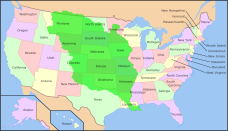
In, 1803, Napoleon’s desire to create a French empire on the North American continent vanished and he needed money. April 30th, the United States purchased the Louisiana territory from France, almost doubling the size of the nation. The Native American tribes living on this land no longer had the protection of France and needed to make alliances with the Americans, which the Sauks struggled with. During the Revolutionary War, many Native Americans east of the Mississippi river sided with Great Britain; so Americans feared that the Sauk and other Native American tribes east of the Mississippi weren’t loyal to the United States. This fear of the Sauk tribes caused a great deal of racial tension between the United States and the Sauk. Since the United States was the Sauks new government leader, the Sauks expected fair treatment, just like the other tribes already under the rule of the United States. Many members of the Sauk nation felt that the United States was treating their tribe unfair and treating other tribes better, in particular the Osage tribe. The Osage tribe continually received gifts, and protection against other tribes by the United States, which the Sauks never received. This was because the Sauk never ceded their land like the other Native American tribes.[8] The fear that the Sauks were working with Great Britain to take over the United States created racial discrimination against the Sauk nation, which angered Black Hawk (Sauks war leader), who already had a dislike for the “White Settlers.”[9]
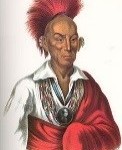

The manifested fear the United States had against the Sauks created another type of racial tension. Many Americans oppressed members of the Sauk nation, solely because of their race and tribal affiliation. “Our people were treated very badly by the whites on many occasions” said Black Hawk, in his autobiography. He gave several examples, one example is about how a hungry Sauk woman pulled a few suckers of corn out of a white man’s corn field and then she was beaten severely as a consequence. Another example he gives is when a young man in his tribe opens a fence which crossed the Sauk’s road to take his horse through and was beaten by two white men with clubs, the young man later died from the injuries.[10] These types of acts were common occurrences for the Sauk. This would continually make the Sauk and in particular, their war leader Black Hawk, very angry. A different way that the Sauks were oppressed was through the treaty of 1804. This was a very clever way in which William Henry Harrison gained much of the Sauk’s land. Several Sauk went to St. Louis on October 27, 1804, in order to receive a pardon for the murder of three white men who were killed because of an altercation. This altercation broke out because the three white men were illegally living north of St. Louis, along the Cuivre River. The Sauks that were headed to St. Louis believed that they were bringing gifts in order to receive a pardon for the individuals involved in the killing. However, Harrison, Governor of the Indiana Territory came up with a plan to trick these Sauk into signing their land away for the pardon. What the Sauks signed is considered the treaty of 1804. Harrison knew that the men didn’t have the authority to cede their land, but he was taking advantage of the situation. He was oppressing them because he knew he could, given the circumstances.[11] This incident, along with the other made the racial tension grow between the Sauk and the United States. The oppression of the Sauks created a great deal of anger within many tribal members, which ultimately became one of the factors of why the war started.
While this oppression was occurring in the early 1800s, the United States wanted more land and power, to achieve this; they would cede the land of many different Native American tribes, with deals that favored the government. Since many Sauks felt that their land was wrongfully ceded, when the Americans started pushing them off their land they got very angry. More and more Americans started to settle on the Sauks land when they realized there was a surplus of lead that could be profitably mined.[12] When the Sauks returned to their tribal land, they were just trying to re-inhabit their homes. Then when the Sauks were attacked by the local militia, the angry Sauks took action and decided to fight for their land (as a last resort). [13]
Ultimately, the cause of the Black Hawk War was a long history of racial tensions between the United States and the Sauk, along with the United States wrongfully seizing the Sauk’s land. Many Americans during 1832 feared the Sauk living east of the Mississippi river because they fought alongside Great Britain during the Revolutionary War, then following the war they continued to have contact with them. This fear created a misunderstanding between the United States and the Sauk. When the Sauk returned to their land with 1200 people, many settlers were alarmed and thought they were under attack. This misunderstanding would only develop because of racial tensions and because of the fear that many white settlers had of the Sauk. The fear that the settlers had prior to the war; made it so many white settlers oppressed the Sauks. Due to the oppression, many Sauks were furious, causing them to disregard the 1804 treaty and making them more susceptible to fighting. While racial tensions were a major factor of the war, United States taking the Sauk’s land was another factor because many of the Sauk felt their land was taken deviously.
Many of us fail to recognize that the land we live on today was taken from varies Native American tribes. We only look at major Native American wars that don’t pertain to the Midwest. In the case of Wisconsin, the south-west area was officially taken by the United States in the Black Hawk War. Many of us never learned about this in our history classes because we are ashamed of what our country did in order to gain the land we live on today. This war was caused because the United States pushed the Sauks of their land and racial tensions were high.
After the war, the Sauk eventually moved from the Midwest to a Sauk reservation in Oklahoma in 1869.[14] Some Sauk still live in the Midwest, but there are little to no Sauks living in Wisconsin. Without the Black Hawk War, we may have been able to see a larger number of Sauk within our communities.
“The white people, who are trying to make us over into their image, they want us to be what they call “assimilated,” bringing the Indians into the mainstream and destroying our own way of life and our own cultural patterns. They believe we should be contented like those whose concept of happiness is materialistic and greedy, which is very different from our way.
We want freedom from the white man rather than to be integrated. We don’t want any part of the establishment, we want to be free to raise our children in our religion, in our ways, to be able to hunt and fish and live in peace. WE don’t want power, we don’t want to be congressmen, or bankers….we want to be ourselves. WE want to have our heritage, because we are the owners of this land and because we belong here.
The white man says, there is freedom and justice for all. We have had “freedom and justice,” and that is why we have been almost exterminated. We shall not forget this.” – Grand Counsel of Native Americans[15]
[1]Hawk, Black. “Native American Quote’s.” Native American Quote’s. n.d. Web. 01 Dec. 2013.
[2]Jung, Patrick J. The Black Hawk War of 1832. Norman, Oklahoma: University of Oklahoma Press, 2007.
[3]“The Black Hawk War.” Wisconsin Historical Society. n.d. Web. 29 Oct. 2013.
[4]Hawk, Black. “The Massacre at Bad Axe: Black Hawk’s Account.” Wisconsin Historical Society. [1833]. Web. 05 Nov. 2013.
[5]“The Black Hawk War.” Wisconsin Historical Society. n.d. Web. 29 Oct. 2013.
[6]Street, Joseph Montfort. “Letters about White Incursions onto Indian Lands in 1827.” Wisconsin Historical Society. Dec.-Jan. 1827-1828. Web. 09 Nov. 2013.
[7]Treaty of 1804.” Black Hawk State Historic Site. n.d. Web. 01 Dec. 2013.
[8]Treaty of 1804.” Black Hawk State Historic Site. n.d. Web. 01 Dec. 2013.
[9]Black Hawk. “Autobiography of Ma-ka-tai-me-she-kia-kiak, or Black Hawk…”(Rock Island, Illinois,1833). Wisconsin Historical Society. Web. 05 Nov. 2013.
[10]Black Hawk. “Autobiography of Ma-ka-tai-me-she-kia-kiak, or Black Hawk…”(Rock Island, Illinois,1833). Wisconsin Historical Society. Web. 05 Nov. 2013.
[11]Treaty of 1804.” Black Hawk State Historic Site. n.d. Web. 01 Dec. 2013.
[12]“The Black Hawk War.” Wisconsin Historical Society. n.d. Web. 29 Oct. 2013.
[13]Street, Joseph Montfort. “Letters about White Incursions onto Indian Lands in 1827.” Wisconsin Historical Society. Dec.-Jan. 1827-1828. Web. 09 Nov. 2013.
[14]McCollum, Timothy James. “Sac and Fox.”Oklahoma Historical Society’s Encyclopedia of Oklahoma History and Culture. n.d. Web. 01 Dec. 2013.
[15]Hawk, Black. “Native American Quote’s.” Native American Quote’s. n.d. Web. 01 Dec. 2013.